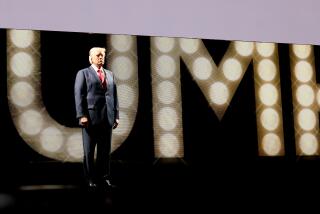Republican Chairman Quits Amid Criticism
- Share via
WASHINGTON — Republican Chairman James S. Gilmore on Friday announced plans to quit his post, following two key GOP losses last month and amid worsening relations with White House political operatives.
Gilmore, whose term as governor of Virginia also is ending, said he will leave the helm of the Republican National Committee in January to reduce the burden that travel placed on his family. Others said clashes with White House political counselor Karl Rove influenced his decision.
Gilmore increasingly had become a target of criticism within GOP ranks as attention turned to the 2002 campaign. With control of the Senate, House and 36 governorships--including those in California, Florida, Illinois, Pennsylvania, Ohio, Texas and New York--at stake, senior Republicans were growing concerned that Gilmore was not suited for the key party job.
President Bush placed Gilmore in the RNC job last January. Gilmore, 52, called Bush on Thursday night to tell him he would be quitting, White House press secretary Ari Fleischer said Friday, and the president did not try to talk him into staying.
“He understood the governor’s reasons and was disappointed to hear that he was leaving, because he thinks he’s done a very good job at the Republican National Committee,” Fleischer said.
Racicot Likely Successor
Among Republicans, former Montana Gov. Marc Racicot was mentioned widely as a likely replacement if, as one acquaintance put it, he can tie up some business commitments. Racicot grew in popularity with the president’s team a year ago with each appearance as a Bush spokesman during the protracted Florida recount.
Other prospects include Rep. J.C. Watts Jr. of Oklahoma, Rep. Henry Bonilla of Texas, former Rep. Bill Paxton of New York, and Mary Matalin, Vice President Dick Cheney’s top political aide.
The job of party chairman is an amalgam of chores: fund-raiser, arbiter of party disputes, chief spokesman on political matters. And, perhaps most important, the chairman is one of those who decides how the party will allocate its money in election battles.
The job is trickier when the party occupies the White House, because the president is the party’s public face and the president’s political operatives in the White House expect the chairman’s deference to their political decisions.
Complicating Gilmore’s tenure was the party’s troubled performance in November’s off-year elections. Democrats took the governorships of New Jersey and Gilmore’s own state; the Republicans could point to victories only in the New York mayoral contest--won by Michael Bloomberg, a recent convert from the Democratic Party--and a limited collection of lesser races.
“When you have the White House bragging about winning the Pennsylvania state Supreme Court, that’s pathetic,” said one Republican campaign operative.
The focus now is on next November--reflected by the heated GOP response Friday to a Democratic ad planned for a handful of House districts. It chastises Republicans for supporting corporate tax cuts when “working Americans are hurting, thousands of soldiers are defending our country and we are all being asked to sacrifice.”
Rep. Thomas M. Davis of Virginia, who directs the GOP’s House campaign committee, said, “It is wrong to question patriotism and to take advantage of an economic downturn caused by the Sept. 11 tragedy, for partisan gain.”
Tensions With Rove
With the White House starting to plot strategy for the 2002 elections, Gilmore “was pushed toward the end of the board and decided to jump rather than fight his way back onto the ship,” said one Republican insider. “He understood his role was going to change.”
Another Republican, who like the others spoke on the condition of anonymity to avoid possible ill will with the White House, said Gilmore’s tenure had been marked by tensions with Rove, Bush’s longtime political advisor.
Rove was described as determined to run party operations from his office in the White House West Wing, with deputy RNC chairman Jack Oliver running day-to-day operations at the party offices near the Capitol.
By this account, tensions grew over the summer and boiled over after election day.
Gilmore “is a smart, determined, shrewd guy who’s in your face,” said this Republican. “He’s not a wallflower. I think he believed that he would be in charge of running the RNC, making strategic decisions--where to be involved in races, where to spend money. In point of fact, he was going to be a figurehead chairman.”
“After the election losses in November, it became clear that he had the option of staying on, but staying on in the capacity of flying around the country to North Dakota and other places to give speeches at chicken dinners,” he said.
In a written statement, Gilmore said that since assuming the party’s chairmanship he had spent 107 nights away from his wife and two sons.
“With the importance of the 2002 elections for our country and the requirements that I be a full-time chairman of the Republican National Committee, making appearances across the country in Detroit, Dallas or Denver, neither I nor my family can see any light at the end of this tunnel,” he said.
Terry McAuliffe, the Democratic Party chairman, said of Gilmore: “I enjoyed going head-to-head with him on philosophical face-offs. It was a friendly rivalry. We could disagree without being disagreeable.”
*
Gerstenzang reported from Washington and Barabak reported from Los Angeles. Times staff writers Edwin Chen and Richard Simon contributed to this report.
More to Read
Get the L.A. Times Politics newsletter
Deeply reported insights into legislation, politics and policy from Sacramento, Washington and beyond. In your inbox twice per week.
You may occasionally receive promotional content from the Los Angeles Times.











